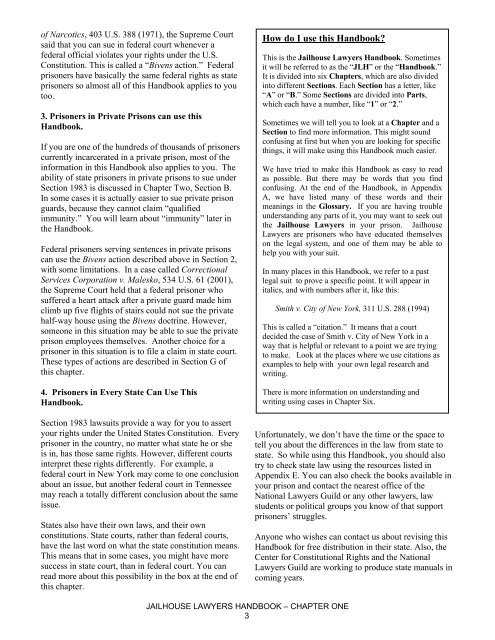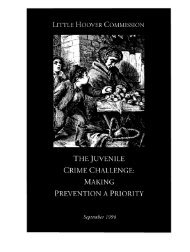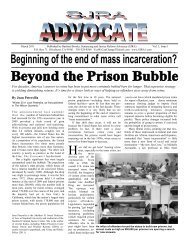Jailhouse Lawyer's Handbook - Sentencing and Justice Reform ...
Jailhouse Lawyer's Handbook - Sentencing and Justice Reform ...
Jailhouse Lawyer's Handbook - Sentencing and Justice Reform ...
Create successful ePaper yourself
Turn your PDF publications into a flip-book with our unique Google optimized e-Paper software.
of Narcotics, 403 U.S. 388 (1971), the Supreme Court<br />
said that you can sue in federal court whenever a<br />
federal official violates your rights under the U.S.<br />
Constitution. This is called a “Bivens action.” Federal<br />
prisoners have basically the same federal rights as state<br />
prisoners so almost all of this <strong>H<strong>and</strong>book</strong> applies to you<br />
too.<br />
3. Prisoners in Private Prisons can use this<br />
<strong>H<strong>and</strong>book</strong>.<br />
If you are one of the hundreds of thous<strong>and</strong>s of prisoners<br />
currently incarcerated in a private prison, most of the<br />
information in this <strong>H<strong>and</strong>book</strong> also applies to you. The<br />
ability of state prisoners in private prisons to sue under<br />
Section 1983 is discussed in Chapter Two, Section B.<br />
In some cases it is actually easier to sue private prison<br />
guards, because they cannot claim “qualified<br />
immunity.” You will learn about “immunity” later in<br />
the <strong>H<strong>and</strong>book</strong>.<br />
Federal prisoners serving sentences in private prisons<br />
can use the Bivens action described above in Section 2,<br />
with some limitations. In a case called Correctional<br />
Services Corporation v. Malesko, 534 U.S. 61 (2001),<br />
the Supreme Court held that a federal prisoner who<br />
suffered a heart attack after a private guard made him<br />
climb up five flights of stairs could not sue the private<br />
half-way house using the Bivens doctrine. However,<br />
someone in this situation may be able to sue the private<br />
prison employees themselves. Another choice for a<br />
prisoner in this situation is to file a claim in state court.<br />
These types of actions are described in Section G of<br />
this chapter.<br />
4. Prisoners in Every State Can Use This<br />
<strong>H<strong>and</strong>book</strong>.<br />
Section 1983 lawsuits provide a way for you to assert<br />
your rights under the United States Constitution. Every<br />
prisoner in the country, no matter what state he or she<br />
is in, has those same rights. However, different courts<br />
interpret these rights differently. For example, a<br />
federal court in New York may come to one conclusion<br />
about an issue, but another federal court in Tennessee<br />
may reach a totally different conclusion about the same<br />
issue.<br />
States also have their own laws, <strong>and</strong> their own<br />
constitutions. State courts, rather than federal courts,<br />
have the last word on what the state constitution means.<br />
This means that in some cases, you might have more<br />
success in state court, than in federal court. You can<br />
read more about this possibility in the box at the end of<br />
this chapter.<br />
How do I use this <strong>H<strong>and</strong>book</strong>?<br />
This is the <strong>Jailhouse</strong> Lawyers <strong>H<strong>and</strong>book</strong>. Sometimes<br />
it will be referred to as the “JLH” or the “<strong>H<strong>and</strong>book</strong>.”<br />
It is divided into six Chapters, which are also divided<br />
into different Sections. Each Section has a letter, like<br />
“A” or “B.” Some Sections are divided into Parts,<br />
which each have a number, like “1” or “2.”<br />
Sometimes we will tell you to look at a Chapter <strong>and</strong> a<br />
Section to find more information. This might sound<br />
confusing at first but when you are looking for specific<br />
things, it will make using this <strong>H<strong>and</strong>book</strong> much easier.<br />
We have tried to make this <strong>H<strong>and</strong>book</strong> as easy to read<br />
as possible. But there may be words that you find<br />
confusing. At the end of the <strong>H<strong>and</strong>book</strong>, in Appendix<br />
A, we have listed many of these words <strong>and</strong> their<br />
meanings in the Glossary. If you are having trouble<br />
underst<strong>and</strong>ing any parts of it, you may want to seek out<br />
the <strong>Jailhouse</strong> Lawyers in your prison. <strong>Jailhouse</strong><br />
Lawyers are prisoners who have educated themselves<br />
on the legal system, <strong>and</strong> one of them may be able to<br />
help you with your suit.<br />
In many places in this <strong>H<strong>and</strong>book</strong>, we refer to a past<br />
legal suit to prove a specific point. It will appear in<br />
italics, <strong>and</strong> with numbers after it, like this:<br />
Smith v. City of New York, 311 U.S. 288 (1994)<br />
This is called a “citation.” It means that a court<br />
decided the case of Smith v. City of New York in a<br />
way that is helpful or relevant to a point we are trying<br />
to make. Look at the places where we use citations as<br />
examples to help with your own legal research <strong>and</strong><br />
writing.<br />
There is more information on underst<strong>and</strong>ing <strong>and</strong><br />
writing using cases in Chapter Six.<br />
Unfortunately, we don’t have the time or the space to<br />
tell you about the differences in the law from state to<br />
state. So while using this <strong>H<strong>and</strong>book</strong>, you should also<br />
try to check state law using the resources listed in<br />
Appendix E. You can also check the books available in<br />
your prison <strong>and</strong> contact the nearest office of the<br />
National Lawyers Guild or any other lawyers, law<br />
students or political groups you know of that support<br />
prisoners’ struggles.<br />
Anyone who wishes can contact us about revising this<br />
<strong>H<strong>and</strong>book</strong> for free distribution in their state. Also, the<br />
Center for Constitutional Rights <strong>and</strong> the National<br />
Lawyers Guild are working to produce state manuals in<br />
coming years.<br />
JAILHOUSE LAWYERS HANDBOOK – CHAPTER ONE<br />
3





